Editor:
Brandon Sweet
University Communications
bulletin@uwaterloo.ca
New research supports stricter social and economic mandates to reduce COVID-19 spread
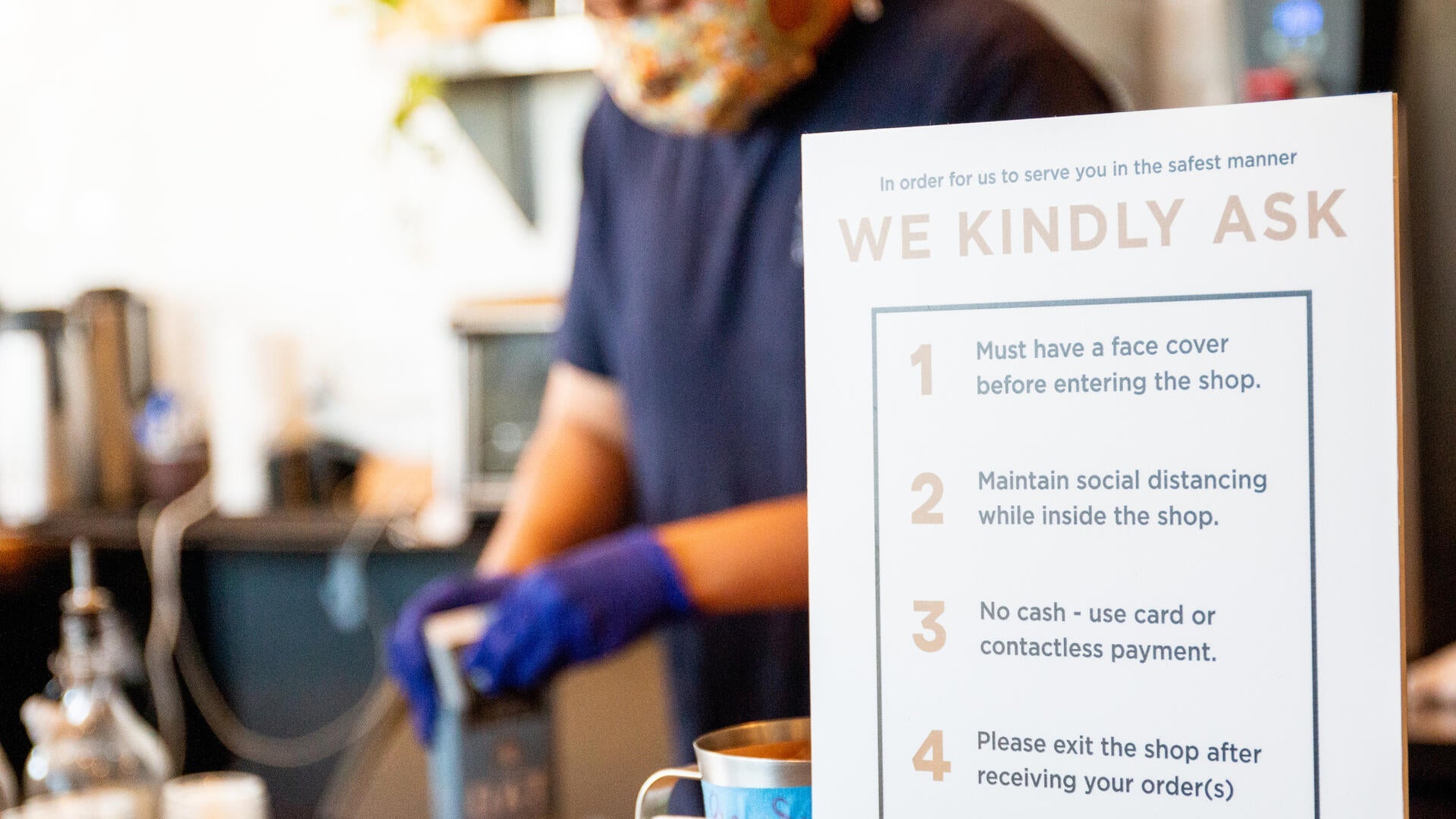
As more people return to indoor settings for work and school, new research shows stricter policy restrictions on business operations and indoor mask-wearing reduced COVID-19 cases in Ontario during the first and second waves.
A new study led by researchers from the University of Waterloo found that stricter non-pharmaceutical interventions, such as policy restrictions on business operations and social gatherings, and indoor mask mandates, are associated with COVID-19 case reductions. Further, estimates based on publicly available Google mobility data suggest that increases in workplace attendance are correlated with higher case counts.
“Public health measures such as mandatory mask use have become increasingly unpopular and divisive in society,” said Anindya Sen, a professor in the University of Waterloo’s Department of Economics. “However, our study offers evidence that these measures do work in reducing the incidence of disease. The results of the forecasting exercises should also be useful to policymakers from a planning perspective.”
In undertaking the study, the researchers used the Google data to assess the effects of public mobility to destinations commonly frequented, such as grocery and retail stores and workplaces. The researchers found that relatively simple forecasting models— known as “time-series models”—can predict one week ahead trends in daily COVID-19 cases in Ontario with some accuracy and are more precise than Ontario government forecasts.
“Our models also offer more accurate daily forecasts than the susceptible-infected-removed model that epidemiologists typically employ,” Sen said. “Matching these mobility measures to corresponding trends in COVID-19 cases should be useful to policymakers in deciding specific types of economic and social lockdowns, as there are still gaps in knowledge on which types of population mobility are the most responsible for the spread of COVID-19 cases.”
The study, Estimating the Effects of Non-Pharmaceutical Interventions (NPIs) and Population Mobility on Daily COVID-19 Cases: Evidence from Ontario, authored by Sen and Waterloo Department of Statistics and Actuarial Science colleagues Nathaniel Stevens, Francis Kiwon, Stefan Steiner, Plinio Morita from the School of Public Health Sciences, and University of Pennsylvania’s Qihuang Zhang, has been accepted for publication in the journal Canadian Public Policy.
Postdoc Appreciation Week just around the corner
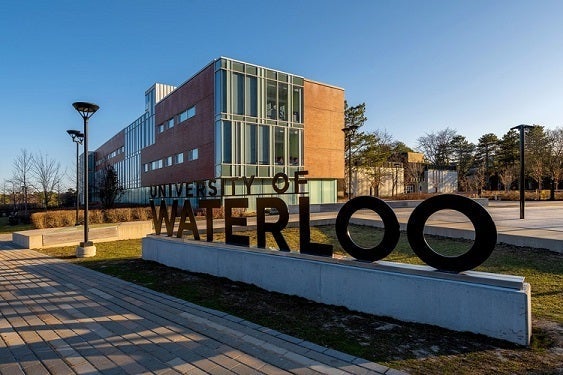
A message from Graduate Studies and Postdoctoral Affairs (GSPA).
We are thrilled to announce that this year the University of Waterloo is once again celebrating National Postdoc Appreciation Week, which runs from Monday September 20 to Friday September 24. Graduate Studies and Postdoctoral Affairs has organized events and giveaways taking place all throughout next week, with the full details on our NPAW 2021 page.
Postdoctoral fellows are such an important part of the UWaterloo community, and we’re grateful for this chance to celebrate them and the important work that they do. Throughout the next week, we will be showcasing profiles of some of our amazing postdocs here on the Daily Bulletin, alongside interesting facts about postdoctoral fellowships in general. Follow these stories to learn a little more about these fascinating and valuable members of our community.
If you are interested in learning more about postdoctoral scholars, you can find lots of information at the National Postdoc Association, and the Canadian Association of Postdoctoral Scholars.
Student Mental Health Research Conference inviting submissions
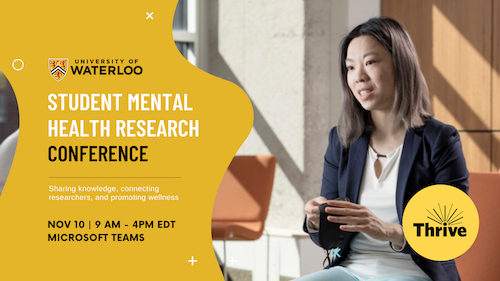
A message from Campus Wellness.
Campus Wellness will be hosting the University of Waterloo's second virtual Student Mental Health Research Conference on November 10, 2021, during Thrive. The goal of this event is to bring together members of the Waterloo community to share knowledge, connect researchers, and promote mental wellness. We are inviting submissions for presentations on student and emerging adult mental health, with an emphasis on the following key themes:
- Promotion of mental health-care strategies;
- Suicide prevention;
- Impact of trauma and sexual violence;
- Equity and wellness (e.g., Indigenous approaches to wellness, effects of anti-Black racism, effects of sexual orientation and gender identity discrimination);
- Harm reduction approaches to substance use; and
- Impact of COVID-19 on mental health.
We will be accepting submissions from UWaterloo students, faculty, and staff until 11:59 p.m. on October 12, 2021. Visit the Thrive website to submit your abstract.
Hack the North taps into tech
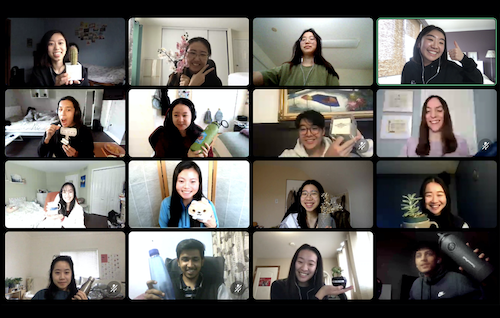
By Jon Parsons.
Most students develop an interest in technology and programming long before they begin their post-secondary education.
The path to becoming a developer, analyst or software engineer does not usually start in a computer science course at university, but in the opportunities available to students outside the classroom.
Hack the North is just this kind of event that allows students to gain valuable skills, learn about the tech industry’s culture and network with like-minded peers who share their interests.
“Hack the North exists to give anyone the ability and the opportunity to dream big,” said Jessica Zhang, one of the co-directors of the event. “Whether that’s through workshops or mentorship, whether that’s through the speaker panels or networking, we’re connecting people and giving them a space and the resources to build something amazing.”
Bringing together more than 3,000 students from Canada and around the globe, Hack the North is a unique student-led hackathon. In its eighth year, the event operates in partnership with the Faculty of Mathematics and the Faculty of Engineering at the University of Waterloo. The two faculties provide ongoing logistical support and funding.
Hack the North is sponsored by some of the biggest and most innovative global and local tech brands, including Hootsuite, Facebook, Google, Cisco, D2L and Ubisoft.
Emily Wang, the other co-director, said the partnerships and sponsorships are instrumental in the success of Hack the North. Some sponsors also provide access to exciting application programming interfaces (APIs), which participants can use to create apps.
“Hackers are free to use whatever technology or platform they want during the event, so we don’t have any limitations or restrictions in that way,” Wang said. “But we do have certain sponsors that have their own APIs that hackers can use, and there are special API prizes as well.”
Even as many participants in Hack the North will enter the event with significant background and experience in tech and programming, there are also many beginners. The hackathon caters to all skill levels. This year, Hack the North features a “Gear Up week,” which runs five days before the main event kicks off and is open to the public.
As Wang explains, Gear Up has some “30 plus workshops to help participants gain new skills and be ready to build their project in the hackathon, instead of learning everything during the weekend of the event.”
Along with its egalitarianism and welcoming of new and experienced hackers alike, Hack the North is organized by students, for students. Zhang is currently enrolled in the computer engineering program at the University of Waterloo. Wang is likewise an undergraduate student in Waterloo’s system design engineering program. Students make up all the volunteers and various organizing committees.
As a student-led and student-organized event, Hack the North has a distinctive character among hackathons. The mandate for the annual event extends beyond learning tech skills to focus on equity, diversity and inclusion in the tech industry writ large. Organizers put the event together so that participants get to meet and work with students from different backgrounds and with different experiences. And throughout the event’s 36 hours, there are numerous side activities and breakout groups so students can meet one another and simply make new connections.
“We have the ability to set the tone and to show hacking can be a way to help underrepresented groups find their place in tech and continue along that path,” said Zhang. “Hack the North is one of the bigger and more established hackathons in the North American hackathon sphere, which means we can be role models for other hackathons. Diversity, equity and inclusion are really important to our organizing team and the whole event. This year we’re focusing on this aspect even more and trying to make strides in that area.”
Every year, Hack the North features special guests and speakers, which have included tech industry leaders, CEOs, and luminaries. Some of these same special guests may also act as judges for the various apps and programs the students create in the hackathon or join student groups as mentors.
This year’s speakers and special guests are something of a guarded secret, so anyone interested should look for ways to get involved. Hack the North 2021 runs from Friday, September 17, to Sunday, September 19. Visit the Hack the North website for more information.
Friday's notes
The University of Waterloo Staff Association (UWSA) has issued a call for nominations for their Board of Directors that runs until September 29, 2021. These positions take office immediately following the UWSA's Annual General Meeting on October 28, 2021. The open positions include:
President-elect
- President-elect, October 2021 – October 2022
- President, October 2022 – October 2023 (full-time release from UWaterloo role plus a stipend)
- Past President, October 2023 – October 2024
Directors
- Two positions at a 3-year term running from October 2021 - October 2024
Anyone interested in finding out more about how to join the UWRA Board can attend one of two upcoming information sessions:
- Thursday, September 23 from 12 noon until 1:00 p.m. on Microsoft Teams
- Monday, September 27 from 12 noon until 1:00 p.m. on Microsoft Teams
Attendees will be able to chat with current UWRA directors and learn more about their roles and responsibilities. To become a candidate, complete and submit the nomination form before 4:30 p.m. on September 29, 2021.

Attention all foodies: it’s not too late to register for Renison’s next series of International Cooking Classes, which are open to everyone in the community. "Our head chef Tim Farley is pleased to be offering another set of 3 classes highlighting delicious fall dishes from turkey pot pie to vegetarian squash soup and curry to international holiday favourites fesenjan and hojeulas," says a note about the series. "Don’t miss your chance to learn how to make some delicious international dishes. You can register for all 3 classes by September 27 and receive a 15 per cent discount.
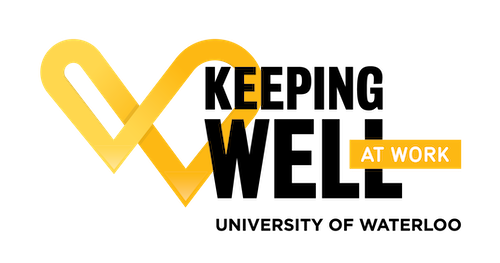
Save the dates: Organization and Human Development (OHD) is presenting the fifth annual Keeping Well at Workconference for UWaterloo employees virtually on October 13 and 19.This year’s virtual event will cover topics about nutrition, mental health, physical well-being, wellness through an equity lens, community and campus wellness, and overall personal health. Registration opens Tuesday, September 21.
Beyond the Bulletin Episode 102

The latest episode of the Beyond the Bulletin Podcast is now live. Charlie Frise, an enterprise co-op student in architectural engineering, uses his co-op terms to build more than his own business. The long-awaited SLC/PAC expansion is now open. UWaterloo will observe the National Day for Truth and Reconciliation on September 30 as a day of commemoration. And Fall Convocation is going to be virtual.
Link of the day
30 years ago: Home Improvement
When and Where to get support
Students can visit the Student Success Office online for supports including academic development, international student resources, leadership development, exchange and study abroad, and opportunities to get involved.
Instructors can visit the Keep Learning website to get support on adapting their teaching and learning plans for an online environment.
Course templates are available within your course in LEARN to help you build and edit your content and assignment pages quickly.
The following workshops, webinars, and events are offered by the KL team (CTE, CEL, ITMS, LIB):
- Independent Remote Course Design Essentials, self-directed, continuous self-enrollment course in LEARN.
- Independent Blended Course Design (iBlend), self-directed, ongoing
-
NEW - Thirty Minute Thursdays– PebblePad – Offered: September 30, October 7, October 21, October 28, November 11, November 18, November 25, 12:00 noon to 12: 30 p.m.
Employees can access resources to help them work remotely, including managing University records and privacy of personal information. Here are some tips for staying healthy while working from home.
Stay informed about COVID cases on campus by consulting the COVID case tracker.
The Writing and Communication Centre has virtual services and programs to help undergrads, grad students, postdocs and faculty members with academic writing.
- Meet with writing advisors in one-to-one appointments to brainstorm, draft, revise, and polish. No time for an appointment? Try email tutoring for undergrads.
- Beat isolation and make writing progress at weekly Virtual Writing Cafés for grad students and faculty or PJ-Friendly Writing Groups for Undergrads.
- Take an online workshop or apply to our popular Dissertation Boot Camp program.
- Faculty can request custom in-class workshops for their courses, or the WCC can facilitate any existing workshops for student groups.
Co-op students can get help finding a job and find supports to successfully work remotely, develop new skills, access wellness and career information, and contact a co-op or career advisor.
The Centre for Career Action (CCA) will be expanding some in-person services for fall 2021. The Tatham Centre will be open with front-desk support beginning September 7, with limited in-person appointments and co-op consults beginning September 20. All services will continue to be offered virtually this term. Book an appointment online or visit our Live Chat to connect with our Client Support Team. The CCA is here to help.
If you feel overwhelmed or anxious and need to talk to somebody, please contact the University’s Campus Wellness services, either Health Services or Counselling Services. You can also contact the University's Centre for Mental Health Research and Treatment. Good2Talk is a post-secondary student helpline available to all students.
While the Library continues to focus on digital resources and consultations, our spaces are open for the fall term. Dana Porter Library is open Monday to Friday, 9 a.m. to 5 p.m., and Davis Centre Library is open Monday to Friday, 9 a.m. to 11 p.m., and Saturday and Sunday, 11 a.m. to 5 p.m. for drop-in individual study space, bookable individual study rooms, drop-in access to computers and printers, book pick-up services and IST Help Desk support. Special Collections & Archives and the Geospatial Centre will be accessible by appointment. Library staff are available for questions via Ask us. Full details on current services and hours are available on the Library’s COVID-19 Update webpage.
The Faculty Association of the University of Waterloo (FAUW) continues to advocate for its members. Check out the FAUW blog for more information.
The University of Waterloo Staff Association (UWSA) continues to advocate for its members. Check out the UWSA blog for more information.
The Sexual Violence Prevention and Response Office (SVPRO) supports all members of the University of Waterloo campus community who have experienced, or been impacted, by sexual violence. This includes all students, staff, faculty and visitors on the main campus, the satellite campuses, and at the affiliated and federated Waterloo Institutes and Colleges. For support, email: svpro@uwaterloo.ca or visit the SVPRO website.
The Indigenous Initiatives Office is a central hub that provides guidance, support, and resources to all Indigenous and non-Indigenous campus community members and oversees the university Indigenization strategy.
The Waterloo Indigenous Student Centre, based at St. Paul’s University College, provides support and resources for Indigenous students, and educational outreach programs for the broader community, including lectures, and events.
WUSA supports for students:
Peer support - MATES, Glow Centre, RAISE, Women’s Centre - Visit https://wusa.ca/peersupport to book an appointment either in person or online for the Fall term!
Food Support Service food hampers are currently available from the Turnkey Desk 24/7 in the Student Life Centre. Drop off locations are also open again in SLC, DC, DP, SCH and all residences.
Bike Centre – Open for drop in and Rentals
Co-op Connection all available online. Check https://wusa.ca for more details.
Centre for Academic Policy Support - CAPS is here to assist Waterloo undergraduates throughout their experience in navigating academic policy in the instances of filing petitions, grievances and appeals. Please contact them at caps@wusa.ca. More information is available.
WUSA Student Legal Protection Program- Seeking legal counsel can be intimidating, especially if it’s your first time facing a legal issue. The legal assistance helpline provides quick access to legal advice in any area of law, including criminal. Just call 1-833-202-4571.
Empower Me is a confidential mental health and wellness service that connects students with qualified counsellors 24/7. They can be reached at 1-833-628-5589.
When and Where (but mostly when)
Healthy Warriors at Home(Online Fitness)
Warrior Rec Registration. Starts September 7. A wide range of programs are being offered this term. Intramural deadline: September 13, 11:00 a.m. Instructional deadline: September 19, 11:59 p.m. Register online.
Warriors vs. Laurier Blood Donation Battle. Join your fellow Warriors, donate blood and help us win the Blood Battle against Laurier for a second year in a row. Set up a profile or add the PFL code: UNIV960995 to your account if you have a blood.ca account already. Questions? Contact WarriorsInfo@uwaterloo.ca.
Drop-in to Warrior Virtual Study Halls on Wednesdays from 5:30 p.m. to 7:00 p.m. Come together in this virtual space to set goals and work independently or in groups each week.
Renison English Language Institute continues to offer virtual events and workshops to help students practice their English language skills.
WUSA Welcome Week, Monday, September 13 to Friday, September 17.
IT Seminar: CALMS – Computer Asset Lifecycle Management System, Friday September 17, 9:00 a.m. to 9:45 a.m. Join online.
Knowledge Integration seminar: “Knowledge Integration and public service for the digital age”, featuring speakers Skaidra Puodziunas and Sukhi Chuhan, Ontario Digital Service, Government of Ontario, Friday, September 17, 1:00 p.m.
Warriors Football Home Opener. Saturday, September 18, 6:00 p.m., Warrior Field. Minor League Day, Residence and Employees Day, The Alliance “We Are One” Game. Tickets available online.
University Senate meeting, Monday, September 20, 3:30 p.m.
Anti-racism book club, White Fragility: Why It’s So Hard for White People to Talk About Racism by Robin DiAngelo and Michael Eric Dyson (2018), Tuesday, September 21, 12:00 noon to 1:00 p.m.
GEDI Exchange Webinar - A 30 Minute Exchange with HueX and Tim Hortons, Tuesday, September 21, 1:00 p.m. Join this discussion with HueX and Tim Hortons as they discuss improving the customer experience with technology by bringing voice-enabled conversational AI to the drive-through.
WaterTalk: What are the Priority Research Needs for Environmental Quality and Environmental Public Health Practice? presented by Bryan Brooks, Thursday, September 23, 10:00 a.m.